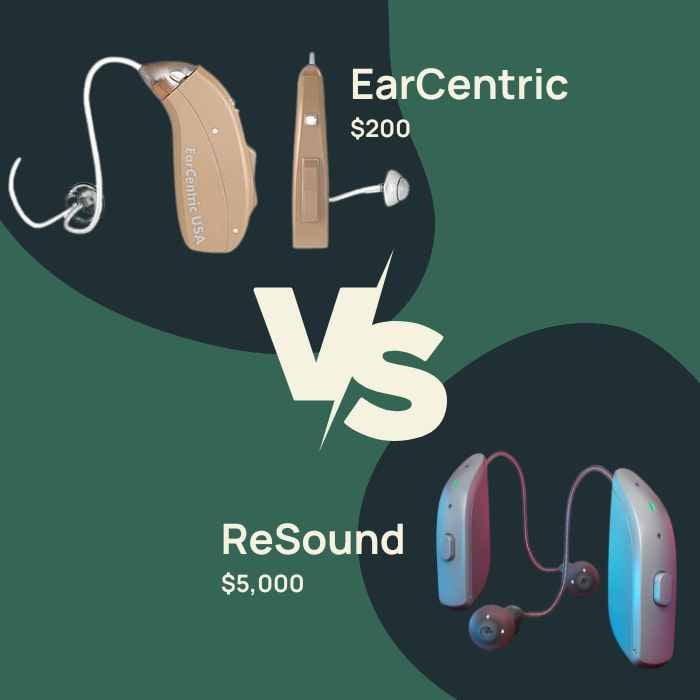Looking for a hearing aid? Or, perhaps you’re thinking of replacing your current device? As an audiologist, I experienced first-hand how confusing and overwhelming it can be for patients to choose a hearing aid.
Hearing aids can be a real handful for anyone to navigate. With so many options on the market, patients are often torn between the more affordable over-the-counter (aka, OTC) option and the premium prescription hearing aid.
That being said, I took it upon myself to help ease that burden and put two different hearing devices to the test.
In a battle of the ears, I'm pitting a budget-friendly option against a premium prescription hearing aid in five rounds. Let’s dig in, and keep scrolling to see how a $200 hearing aid compares to a $5,000 device.
The Contenders
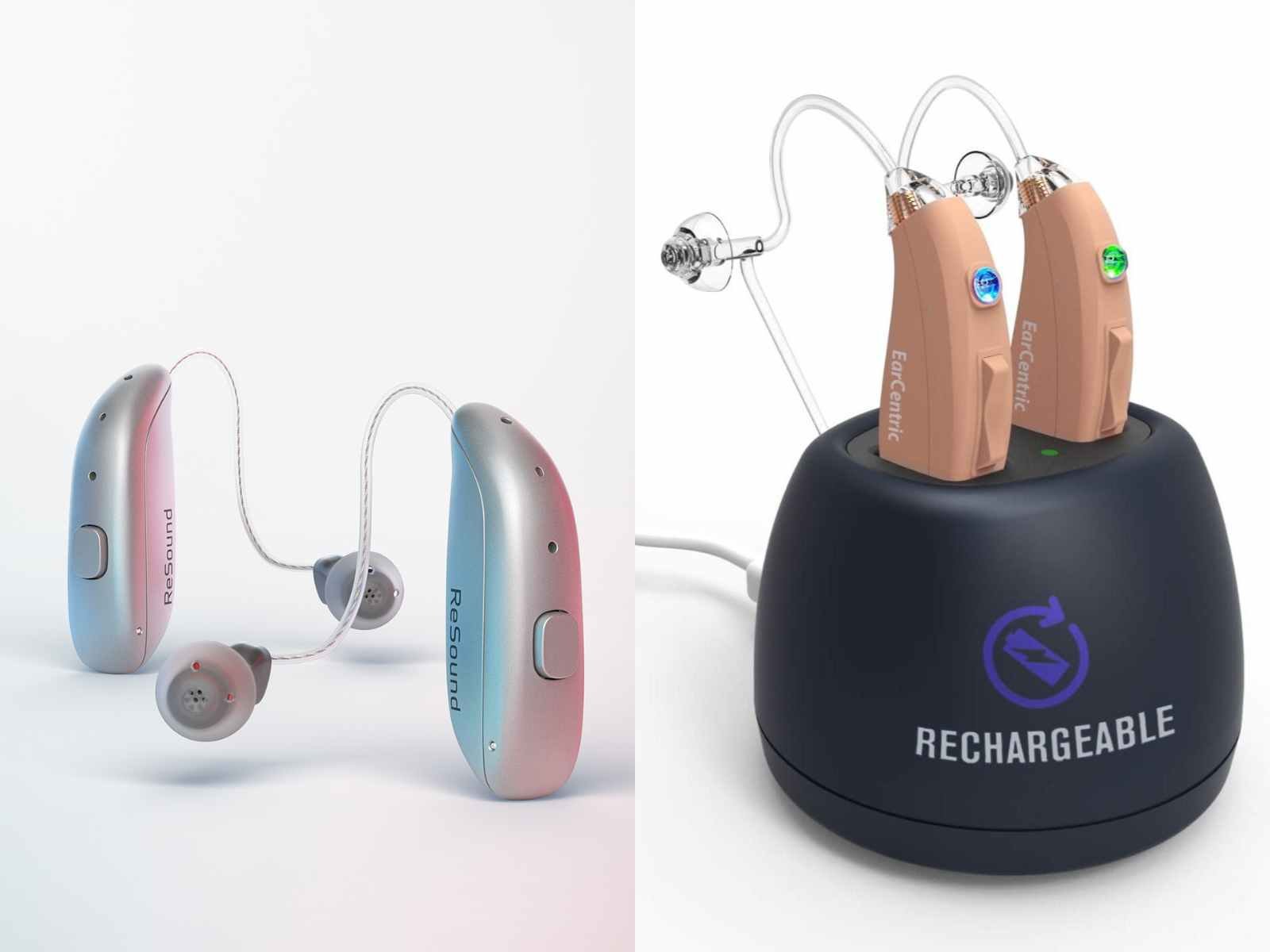
In one corner, we have the EarCentric, boasting top reviews and a “#1 seller” status on Amazon the hearing amplifier category.
This $200 hearing device is advertised for mild to moderate hearing loss, and features a sound boost option.
And, that’s not all. The device is rechargeable, has an estimated 20-hour battery life, and offers customer service support via email or phone.
In the other corner is the ReSound OMNIA prescription hearing aid, which also features a rechargeable—plus optionally disposable—battery that lasts 24 to 30 hours.
This device is equipped to handle a wide range of hearing impairments, from mild to severe, and can be fitted and adjusted to your individual needs and preferences by your healthcare professional.
Without further delay, let’s compare these two devices side-by-side. Read on 👇
Round 1: Style and Comfort
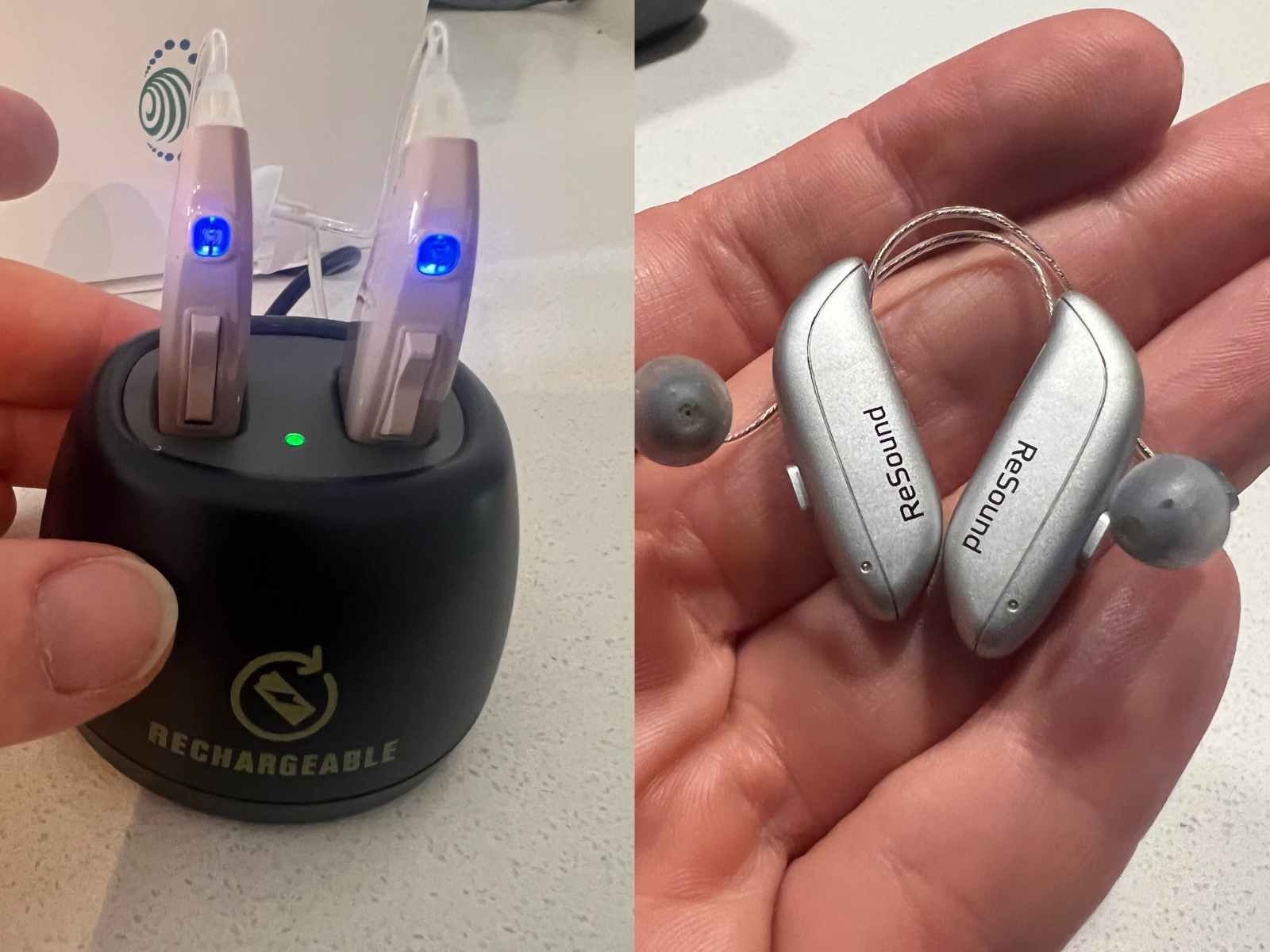
In this first round, let’s examine both hearing aids to see which is more competitive in both style and comfort.
First up, the modestly-priced OTC hearing aid, EarCentric, priced at $200.
This device has a bulky design resembling older hearing aids. It comes in two color options, beige or silver, and various fit options, such as dome tips and slim tube lengths.
The ear hook and tubing option is available in two different slim tube lengths (standard and extra long), and it’s adjustable to fit most ear sizes.
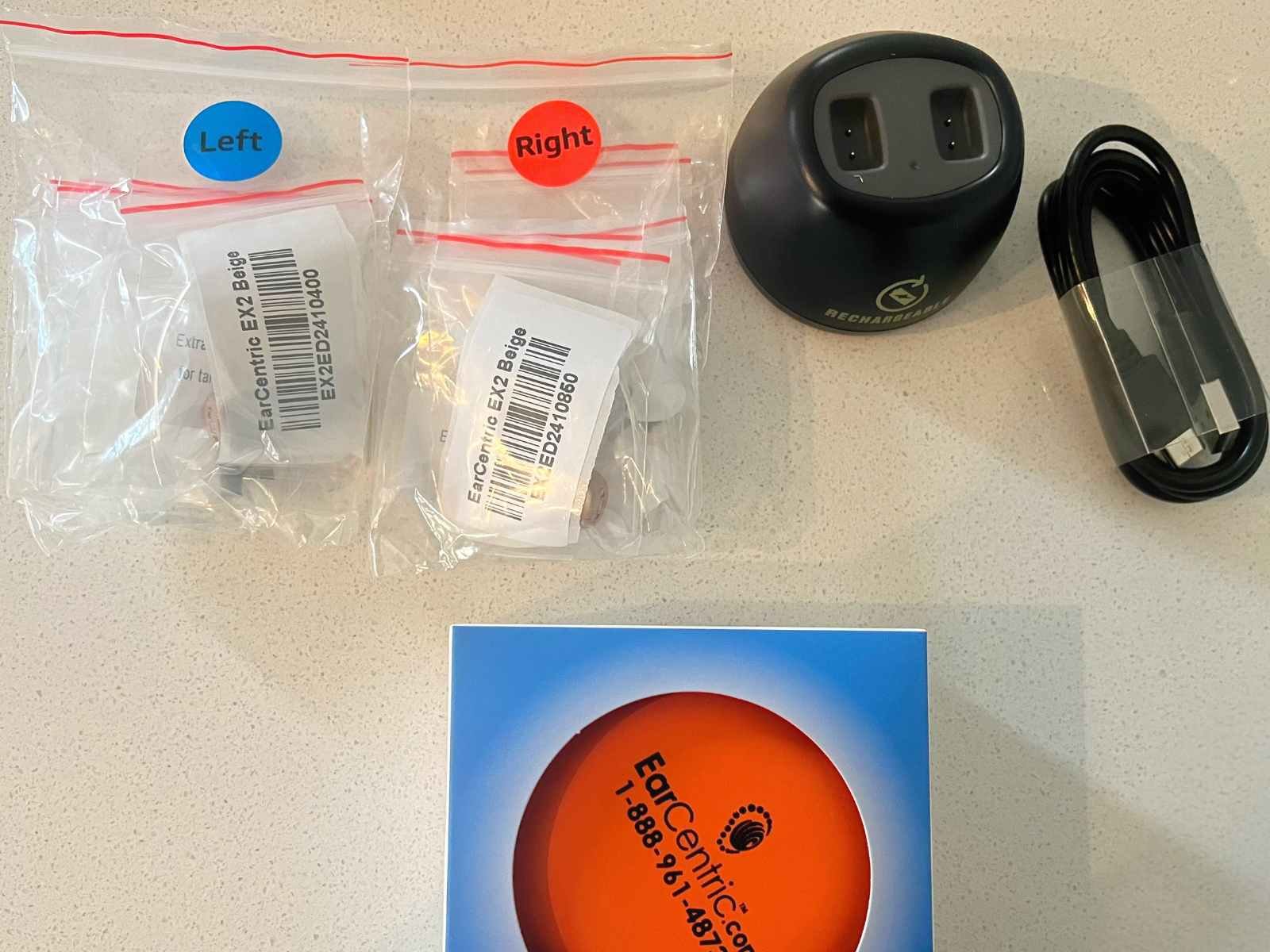
These two length options will probably work for many, but not all, ear sizes and shapes. However, the ear hook and tubing option in the “volume boost kit” provide more variety because you cut the tubing to the appropriate length. There are instructions with visuals to explain how to use and attach the ear hook and tubing, which must be measured and cut to fit the patient’s ear.
However, if you're only dealing with mild hearing loss, the "volume boost kit" may provide too much volume.
Next up, ReSound OMNIA. This prescription hearing aid has a much more sleek appearance and sits discreetly behind the ear with a thin, barely visible receiver wire.
The prescription option has more options for retention, sound quality, and comfort. For example, there are a range of dome tips, encased receivers, or silicone earmolds. With so many choices, there are plenty of opportunities for comfort and retention in the ear.
After a thorough examination, the ReSound OMNIA wins this round.
Round 2: Customization and Sound Quality
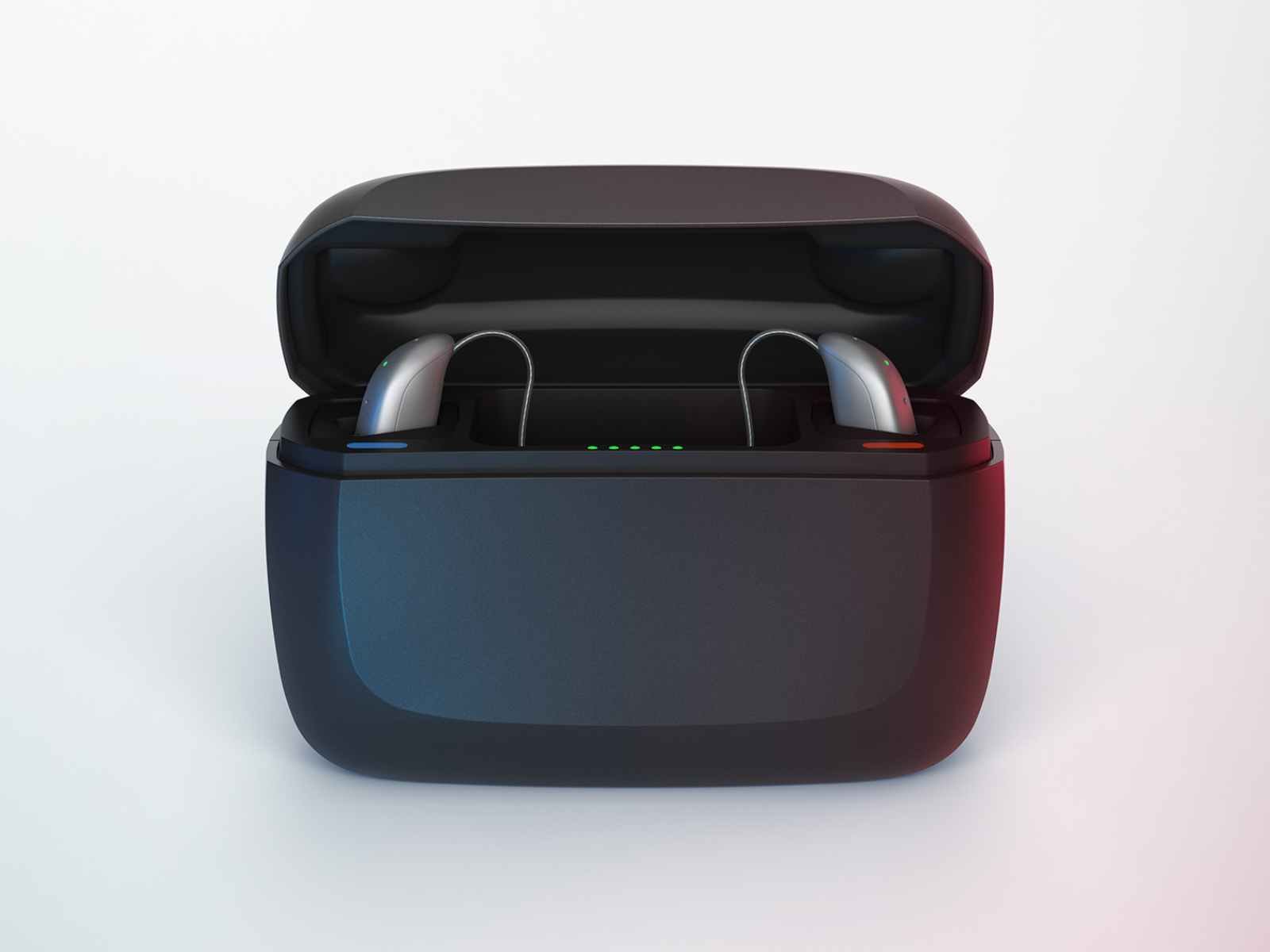
Let's get ready to rumble! In this round, it’s all about customization and sound quality. After all, hearing aid needs to be set up according to your hearing loss and preferences to get the best outcome.
First in the ring is EarCentric. The $200 over-the-counter hearing aid has basic settings to allow for volume control, but it is rather limited. Volume is controlled manually with the volume up or volume down buttons on the device.
I found wearing this hearing device provided volume, but I had a sound quality that felt like being in a tunnel. Fortunately, I didn't experience feedback or whistling from the devices.
Of note, this device will not provide adequate benefit for those with a hearing loss other than the traditional sloping configuration.
On the other hand, the $5,000 prescription hearing aid has a wide range of settings and programs, including background noise reduction and directionality focus.
The hearing aid adjusts automatically based on your environment. However, there are manual programs you can select too. For example, you can choose the "restaurant" program if you're in a noisy bar, cafe, or eatery.
The sound quality was also significantly better with the prescription hearing aid due to its more precise fine-tuning capability from your hearing care professional and individual customization through the ReSound Smart 3D app. For those who prefer lower-tech options, there are also buttons to adjust the volume or programs manually.
And the winner of this round, by unanimous decision is Resound OMNIA.
Round 3: Connectivity
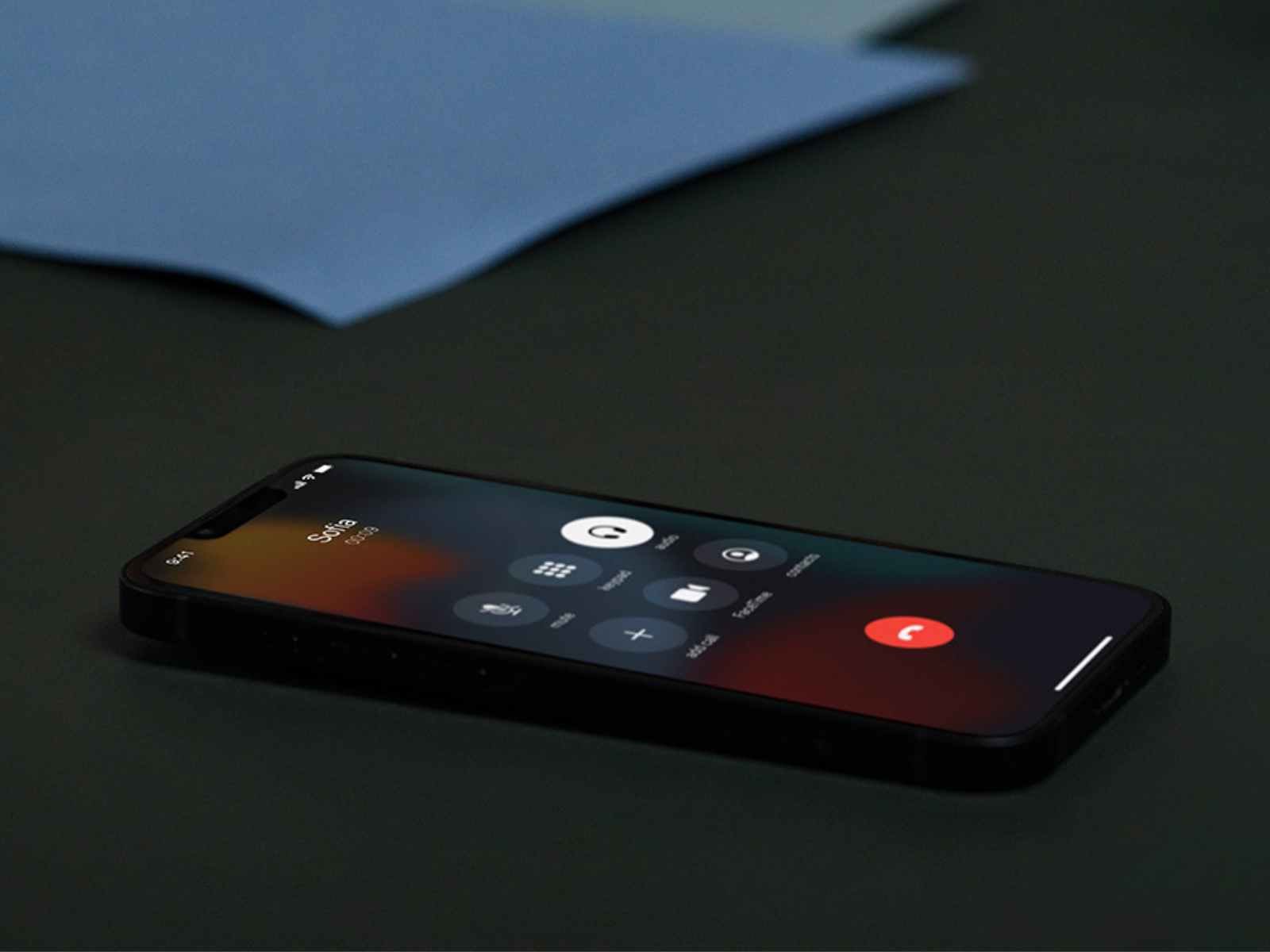
Bluetooth and wireless capabilities are becoming increasingly popular in hearing aids. New to this technology? Bluetooth connectivity lets you hear your phone calls directly in your ear, like your own headset.
Bluetooth allows you to adjust the sound quality using the Smartphone app or have remote programming with your hearing care professional. For most patients nowadays, this tech is one of their top priorities.
Unfortunately, the EarCentric hearing aid fell short in this round, as it had no connectivity options.
As with most lower-priced hearing devices, there is no Bluetooth connectivity available. Thus, it's not possible to stream phone calls, music, or other audio directly to the hearing aids. When using the phone, you'll want to either use a speakerphone or hold the phone higher up on the ear to send the sound through the hearing aid microphones.
In contrast, the ReSound OMNIA has Bluetooth capabilities and can connect to iPhone and Android Smartphones, tablets, and assistive devices (e.g., remote microphone, TV streaming, and so on).
The new OMNIA mini RIC has an improved antenna placement for an even stronger, more stable Bluetooth connection.
The winner of this round? The ReSound OMNIA takes home the trophy thanks to its impressive connectivity features.
Round 4: Customer Service and Care

When it comes to hearing aids, customer service and care go hand in hand. Lets put these two heavyweights—EarCentric and ReSound OMNIA—to the test.
The over-the-counter EarCentric has reasonable support and customer service options, including phone, email, and has a limited warranty.
The amount of support and troubleshooting options is fair for a device in this price range. I sent an email and received a response within a few hours.
Plus, the instruction manual with the devices provides detailed instructions for setting up the devices and what to do for troubleshooting.
In contrast, the ReSound OMNIA hearing aid typically offers a comprehensive warranty three-year—and in some cases a four-year—warranty, support from your dedicated hearing health professional, and a customer service hotline that patients can call for Bluetooth questions and troubleshooting.
Care with a prescription device involves in-person care, repairs, and a loaner device if your hearing aid needs to be sent out.
So, who wins this round? It's a no-brainer, folks. ReSound OMNIA reigns supreme once again with in-person care options.
Round 5: Overall Notes

In this final round, I compiled some general notes about the two hearing aids.
- While ReSound wins out compared to the Amazon device, it's important to note that hearing devices always depend on your needs, use case, and budget.
- The $200 OTC hearing aid may be a good option for individuals with mild hearing loss but still want an affordable option.
- The need for customization, sound quality, and connectivity options are some limitations of the EarCentric device.
- On the other hand, the $5,000 prescription hearing aid may be quite an expense, but it offers top-of-the-line sound quality, customization, and comprehensive customer service and care.
The good news is that there are options for every person in every budget. While ReSound wins out in comparison, the Ear Centric device is a decent option for its price point.
Final Thoughts
Choosing a hearing aid is a personal decision that can impact the quality of life for many individuals. While the EarCentric hearing aid may seem more affordable, it lacks essential features that a prescription hearing aid can offer. Ultimately, the ReSound OMNIA outperformed the over-the-counter hearing aid in all five rounds.
At the same time, I recommend patients looking for hearing aids seek advice and guidance from qualified audiologists to help them make the right decision. Remember, wearing the right hearing aid is a personal comfort that can cause significant changes in everyday life.

